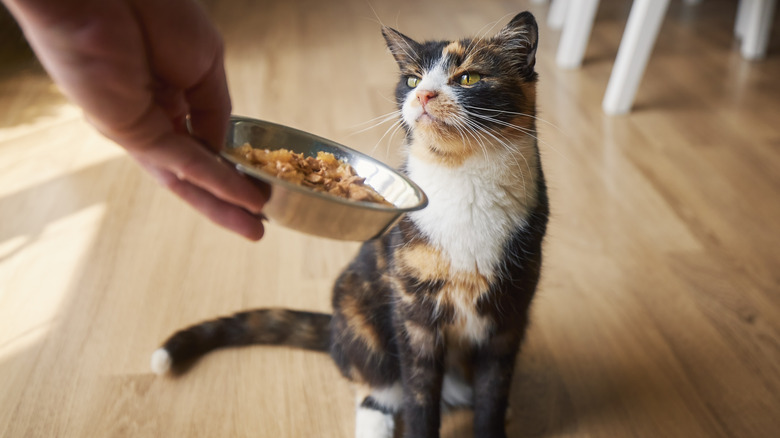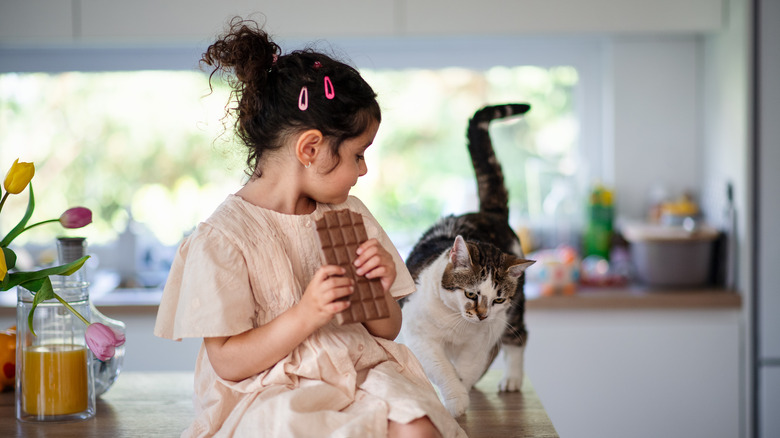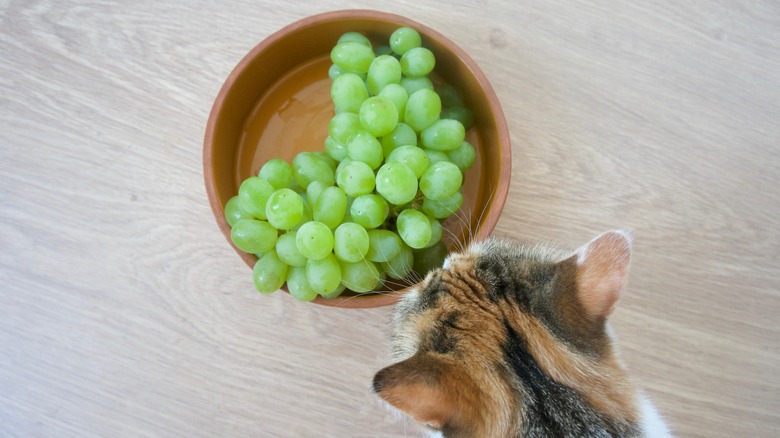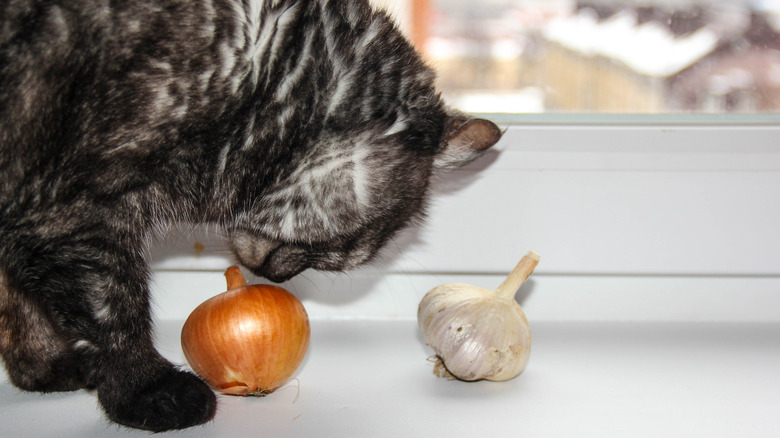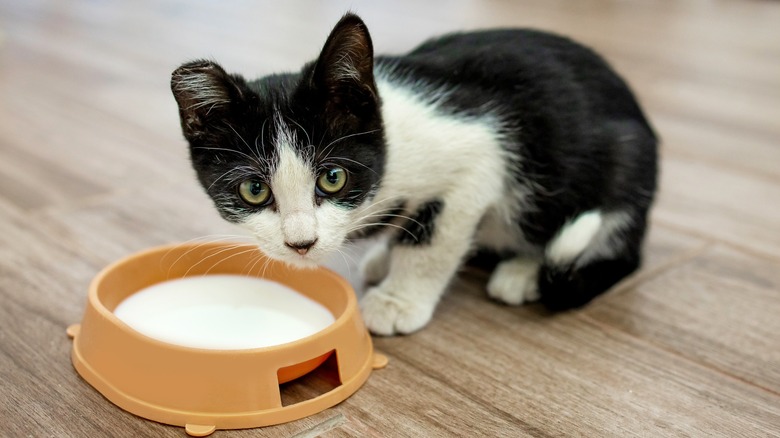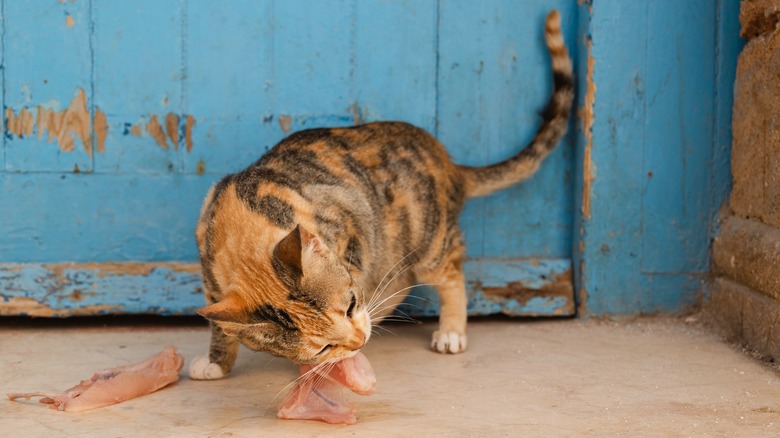Don't Give Cats These 5 Foods Or You'll Regret It
Bringing a cat into your home means you'll inevitably share a lot with them — your sofa, bed, kitchen counter, bathroom sink, warm laptop keyboard, or dining room table will likely capture their interest at some point. The aroma of your meals will also probably grab their attention, leaving you tempted to share that with them as well. While some foods are harmless and even healthy for cats, others can be dangerous, so it's important to know the difference. Chocolate, grapes and raisins, alliums (onions and garlic), dairy, and raw meat are some of the foods you should never feed a cat.
Most of these foods are safe for humans, but may be toxic or otherwise dangerous to cats and can lead to illness or worse. In general, food toxicity in felines is similar to food poisoning in humans. If you've ever gotten sick from something you ate, you can probably vividly remember your symptoms. Maybe it was stomach cramps, nausea, vomiting, diarrhea, a fever, or all of the above. A cat that has been poisoned after eating a certain food may exhibit some of these same side effects, among others, depending on the food and amount consumed.
If your cat eats a food item from the list below, contact your veterinarian to determine the best course of action. They will ask you about the food and quantity consumed, and may also recommend that you bring your feline friend in to induce vomiting or so they can monitor them.
Chocolate
Whether it's a piece of cake, a brownie, or a candy bar, chocolate in general is a no-no for cats, especially cocoa powder and other types of bitter chocolate. Chocolate contains an ingredient called theobromine, a bitter alkaloid found in the cacao plant from where all chocolate originates, that cats can't digest. The higher the theobromine content, the higher the toxicity level is. For this reason, cocoa beans or powder, unsweetened baker's chocolate, and semisweet chocolate are considered the most toxic types of chocolate to cats. White chocolate is the most diluted thereby the least toxic, but it can still be dangerous if eaten in large quantities.
If your cat eats chocolate, toxicity symptoms can range from mild to severe, with some manifesting within an hour after consumption, according to Vetster. Some may relieve themselves on their own without requiring a trip to the vet, such as in cases of minor chocolate toxicosis. Mild signs include vomiting, diarrhea, restlessness, and increased thirst and urination. The more serious ones include hyperactivity, muscle tremors, an elevated body temperature and heart rate, stomach pain, and seizures. Severe poisoning symptoms can be fatal if not handled by a veterinarian.
Grapes and raisins
They're sweet, they contain vitamins and minerals, and they're fun to eat — for humans. Cats, on the other hand, should never eat grapes or raisins. You may be tempted to toss a few raisins on the floor for your cat since they're so small, but doing so can make them ill. Remember, raisins are dried grapes, so even though they're much smaller, they can still be dangerous. PetMD states that grape and raisin toxicity is rare in cats; about 15% of cats and dogs experience toxicity symptoms after consuming one of these foods.
Just as with chocolate, grape toxicity in cats stems from one particular component. The ASPCA concluded that tartaric acid is the culprit. This harmful agent can also be found in homemade playdough and tamarind paste.
A cat that has been poisoned after consuming grapes or raisins might vomit, become restless, or feel too ill to eat. Vomiting, diarrhea, lethargy or weakness, and a decreased appetite are typically the earliest sign of poisoning, often occurring within 24 hours of ingestion. Within the next 24 hours, your cat may exhibit more severe signs associated with kidney damage, such as excessive thirst and urination, loss of appetite, seizures, foul breath, and more vomiting. The worst is kidney disease, but again, it's rare from grape toxicity in cats.
Alliums (onions and garlic)
Allium is a genus of plants that produce garlic and onions, both of which are toxic to cats if ingested. In fact, all vegetables in the allium genus are toxic to cats, including leeks, scallions, chives, and shallots. The toxicity level increases when these foods are dried or pulverized into a powdered form, according to Vetster. What makes these foods toxic? Alliums contain an inorganic compound called thiosulfate that causes damage to the red blood cells in cats.
Signs of garlic and onion toxicity in cats include vomiting, diarrhea, stomach pain, and a reduced appetite. These signs typically manifest within six to 24 hours. Because alliums can damage red blood cells, anemia (low red blood cell count) is another potential risk, characterized by pale or yellow gums, lethargy, and labored breathing. These symptoms typically appear within one to five days. A cat may also have seizures as a result of more severe allium poisoning, but this outcome is rare.
Dairy
You've probably seen movies or photos of cats drinking milk from a small saucer and have concluded that milk is safe for them. Or perhaps you've noticed a circling cat at your feet every time you make a ham and cheese sandwich and assumed that cheese is harmless. Cats can easily smell the high protein and fat content in dairy wafting through the air, and yes, many felines want a taste of cheese. Fortunately, dairy is not toxic to cats, but dairy from cow's milk can still cause problems because most cats are actually lactose intolerant.
Many humans are also lactose intolerant, so you may already be familiar with the symptoms. Abdominal pain, diarrhea, gas, and even vomiting are the most common ones. Cats can experience these same symptoms if they eat or drink products related to cow's milk. Cats that can tolerate lactose, on the other hand, can safely eat or drink this type of dairy without getting sick. However, it's best to allow it only sparingly, since the fat and sugar content can still be an issue.
Wondering about dairy alternatives for your lactose-intolerant, dairy-loving cat? In an article published in The Honest Kitchen, Dr. Leilani Alvarez says goat's milk is generally a safe alternative for cats, since it contains less lactose than cow's milk. However, Dr. Sandra C. Mitchell, discourages goat milk for kittens in a PetMD article.
Raw meat
Feral cats obviously don't have anyone to cook their food, so when they eat their prey, they're consuming raw meat. This doesn't necessarily mean that it's safe or that you should feed raw meat to your indoor cat. Feral cats do it because they have no choice, but it's not without risks. Raw meat poses a threat to cats, just as it does for humans, due to harmful bacteria like salmonella and listeria. The obvious solution to the risk is to cook the meat to the appropriate temperature before feeding it to your cat. Be sure to skip the seasoning and trim the fat.
If your cat were to consume contaminated raw meat, they can be infected with listeriosis or salmonellosis. These illnesses typically result in vomiting, fever, lethargy, and decreased appetite. Infected female cats may also experience fertility issues. Facial nerve paralysis is another sign of listeriosis. Additional symptoms of salmonellosis include diarrhea, eye inflammation, stomach pain, swollen lymph nodes, and mucus in feces.
It's okay to share food with your cat, but only if you do it wisely. And if your feline friend ever consumes something they shouldn't, whether it's raw meat, chocolate, onions, or any other harmful food, call your veterinarian or an emergency vet for guidance. The amount of food consumed and your cat's weight will help them make a decision on the next step.
